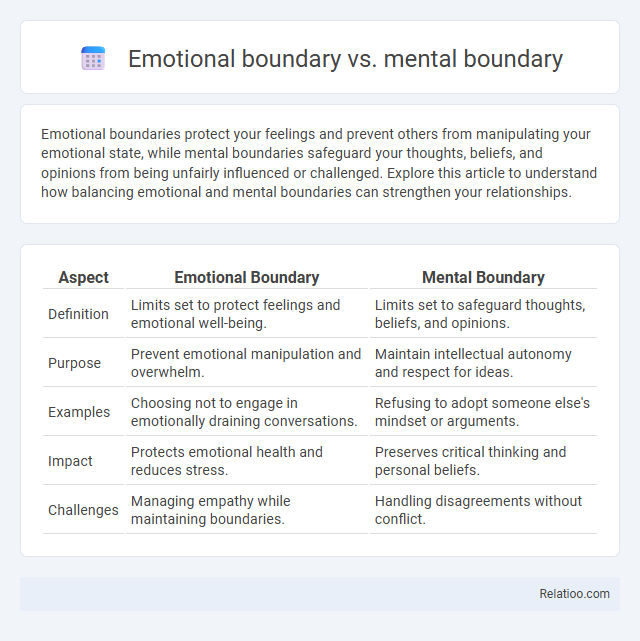Emotional boundaries protect your feelings and prevent others from manipulating your emotional state, while mental boundaries safeguard your thoughts, beliefs, and opinions from being unfairly influenced or challenged. Explore this article to understand how balancing emotional and mental boundaries can strengthen your relationships.
Table of Comparison
| Aspect | Emotional Boundary | Mental Boundary |
|---|---|---|
| Definition | Limits set to protect feelings and emotional well-being. | Limits set to safeguard thoughts, beliefs, and opinions. |
| Purpose | Prevent emotional manipulation and overwhelm. | Maintain intellectual autonomy and respect for ideas. |
| Examples | Choosing not to engage in emotionally draining conversations. | Refusing to adopt someone else's mindset or arguments. |
| Impact | Protects emotional health and reduces stress. | Preserves critical thinking and personal beliefs. |
| Challenges | Managing empathy while maintaining boundaries. | Handling disagreements without conflict. |
Understanding Emotional Boundaries
Understanding emotional boundaries involves recognizing your feelings and limits to protect your well-being and maintain healthy relationships. Unlike mental boundaries, which guard your thoughts and beliefs, emotional boundaries specifically regulate your emotional experiences and interactions. Establishing clear emotional boundaries helps you prevent emotional overreach and ensures your feelings are respected in personal and professional environments.
Defining Mental Boundaries
Mental boundaries involve setting limits on your thoughts, beliefs, and values to protect your cognitive space from external influence or internal confusion. They play a distinct role from emotional boundaries, which regulate your feelings and emotional responses, ensuring you don't absorb others' emotional states. Understanding and defining mental boundaries enhances your ability to maintain clarity, autonomy, and responsibility over your mental processes.
Key Differences Between Emotional and Mental Boundaries
Emotional boundaries involve protecting your feelings and managing emotional energy, while mental boundaries focus on your thoughts, beliefs, and opinions, determining what you accept mentally from others. Emotional boundaries help you avoid emotional manipulation and burnout, whereas mental boundaries prevent cognitive overload and maintain clarity in your personal beliefs. Understanding these distinctions ensures Your well-being by safeguarding both your emotional resilience and intellectual autonomy.
Signs of Healthy Emotional Boundaries
Healthy emotional boundaries are characterized by your ability to express feelings without fear of judgment, respect for others' emotions, and maintaining autonomy over your emotional responses. Unlike mental boundaries that protect your thoughts and beliefs, or physical boundaries that guard your personal space, emotional boundaries allow you to differentiate your emotions from those of others, preventing emotional enmeshment. Signs include feeling safe to say no, experiencing balanced empathy, and recovering quickly from emotional discomfort.
Indicators of Strong Mental Boundaries
Strong mental boundaries enable you to clearly differentiate your thoughts from others', ensuring resilience against external opinions and emotional manipulation. Indicators include maintaining objective perspectives during conflicts, the ability to say no to unreasonable demands, and preserving your mental energy by avoiding overthinking others' behaviors. Clear mental boundaries support healthy decision-making and protect your cognitive well-being.
Common Challenges in Setting Emotional Boundaries
Common challenges in setting emotional boundaries include difficulty recognizing personal limits, fear of rejection, and confusion between emotional and mental boundaries. Emotional boundaries require managing feelings and empathy without over-identifying with others, whereas mental boundaries focus on protecting thoughts and beliefs from external influence. Overlapping these boundaries often leads to blurred lines that complicate maintaining healthy interpersonal relationships.
Obstacles to Maintaining Mental Boundaries
Obstacles to maintaining mental boundaries often include persistent intrusive thoughts, overwhelming external opinions, and difficulty distinguishing personal beliefs from others' influences. Mental boundaries require clear cognitive separation to prevent emotional overload and maintain mental clarity, which can be disrupted by stress, anxiety, or manipulation. Unlike emotional or physical boundaries, mental boundaries focus on protecting internal thought processes, making self-awareness and assertiveness crucial for effective boundary setting.
Strategies for Strengthening Emotional Boundaries
Strengthening emotional boundaries involves recognizing and respecting your feelings while maintaining a clear sense of self separate from others' emotions, unlike mental boundaries that focus on controlling thoughts and beliefs. Strategies include practicing assertive communication, setting limits on emotional availability, and engaging in self-reflection to understand personal triggers and needs. Consistent self-care routines and mindfulness exercises enhance emotional regulation, ensuring healthier interactions and stronger emotional resilience.
Techniques to Enhance Mental Boundaries
Techniques to enhance mental boundaries involve cultivating mindfulness, setting clear limits on information intake, and practicing cognitive restructuring to challenge intrusive thoughts. Your ability to distinguish between your own beliefs and external influences strengthens with regular mental boundary exercises, supporting emotional resilience. Effective mental boundaries protect your mental well-being by promoting focus, self-awareness, and selective engagement with challenging ideas.
The Importance of Balancing Emotional and Mental Boundaries
Balancing emotional and mental boundaries is crucial for maintaining healthy relationships and personal well-being. Emotional boundaries protect individuals from being overwhelmed by others' feelings, while mental boundaries safeguard one's thoughts and beliefs from external influence or manipulation. Clearly defining and respecting both types of boundaries fosters emotional resilience and cognitive clarity, enabling better decision-making and interpersonal harmony.

Infographic: Emotional boundary vs Mental boundary
 relatioo.com
relatioo.com